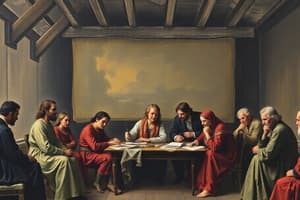Podcast
Questions and Answers
What is the role of political systems in governance?
What is the role of political systems in governance?
- Enforcing strict regulations and limiting civil liberties
- Controlling the media and suppressing freedom of speech
- Maintaining the balance of power and ensuring fair decision-making (correct)
- Providing economic stability and promoting international relations
How are political systems defined?
How are political systems defined?
- By the number of political parties and the frequency of elections
- By the distribution of power and the rules for decision-making (correct)
- By the size of the military and the level of technological advancement
- By the amount of natural resources and the GDP per capita
What is encompassed within a political system?
What is encompassed within a political system?
- Formal institutions of government and informal institutions of civil society (correct)
- Educational systems and healthcare facilities
- Religious institutions and cultural traditions
- Economic policies and market regulations
Why is the balance of power between different branches of government essential?
Why is the balance of power between different branches of government essential?
What is the primary function of political systems in relation to power?
What is the primary function of political systems in relation to power?
What is the purpose of political systems in decision-making?
What is the purpose of political systems in decision-making?
Which type of political system involves decisions made through a centralized process, with little input or participation from the general population?
Which type of political system involves decisions made through a centralized process, with little input or participation from the general population?
Which type of political system is influenced by religious doctrine and values, with little input or participation from the general population?
Which type of political system is influenced by religious doctrine and values, with little input or participation from the general population?
In which type of political system is power held by a small group of individuals, often with significant economic or financial influence?
In which type of political system is power held by a small group of individuals, often with significant economic or financial influence?
Which type of political system involves power held by the people, either directly or through elected representatives?
Which type of political system involves power held by the people, either directly or through elected representatives?
In which type of political system are decisions made in a more open and transparent manner, with a greater degree of public input and oversight?
In which type of political system are decisions made in a more open and transparent manner, with a greater degree of public input and oversight?
Which type of political system involves decisions made behind closed doors, with less transparency and accountability?
Which type of political system involves decisions made behind closed doors, with less transparency and accountability?
In which type of political system is power held by religious leaders or institutions?
In which type of political system is power held by religious leaders or institutions?
Which type of political system involves a process of voting and open debate, with a greater degree of input and participation from the general population?
Which type of political system involves a process of voting and open debate, with a greater degree of input and participation from the general population?
In which type of political system is power held by a single individual or a small group of individuals?
In which type of political system is power held by a single individual or a small group of individuals?
Flashcards are hidden until you start studying
Study Notes
The Importance of Political Systems
Political systems are the foundation of governance and the way in which a country is managed. They determine how power is exercised, who holds the power, and the rules by which the political system operates. This article will explore the different political systems and their implications on governance and decision-making.
Defining Political Systems
A political system is the structure of institutions and processes that govern a state, including the organization of the government, the distribution of power, and the rules that determine how decisions are made. It encompasses the entire range of political activity, including both the formal institutions of government and the informal institutions of civil society.
Political Systems and Governance
Political systems play a crucial role in maintaining the balance of power and ensuring that decisions are made in a fair and transparent manner. They provide a framework for the exercise of power, and they help to ensure that power is not abused.
One of the key aspects of political systems is the balance of power between different branches of government. This balance is essential for maintaining checks and balances, preventing any one branch from becoming too powerful, and ensuring that decisions are made in the best interests of the people.
Political Systems and Decision-Making
The political system also influences how decisions are made. In some systems, decisions are made through a centralized process, with a small group of individuals making decisions on behalf of the entire population. In other systems, decisions are made through a more decentralized process, with a greater degree of input and participation from the general population.
The political system can also influence the level of transparency and accountability in decision-making. In some systems, decisions are made in a more open and transparent manner, with a greater degree of public input and oversight. In other systems, decisions may be made behind closed doors, with less transparency and accountability.
Types of Political Systems
There are many different types of political systems, each with its own unique characteristics and implications for governance and decision-making. Some of the most common types of political systems include:
-
Democracies: In a democracy, power is held by the people, either directly or through elected representatives. Decisions are made through a process of voting and open debate, with a greater degree of input and participation from the general population.
-
Autocracies: In an autocracy, power is held by a single individual or a small group of individuals. Decisions are made through a centralized process, with little input or participation from the general population.
-
Oligarchies: In an oligarchy, power is held by a small group of individuals, often with significant economic or financial influence. Decisions are made through a centralized process, with little input or participation from the general population.
-
Theocracies: In a theocracy, power is held by religious leaders or institutions. Decisions are made through a process that is influenced by religious doctrine and values, with little input or participation from the general population.
Conclusion
Political systems are a fundamental aspect of governance and decision-making, shaping the way in which power is exercised and decisions are made. Understanding the different types of political systems and their implications for governance and decision-making is essential for anyone interested in politics and public policy. By studying political systems, we can gain a deeper understanding of the factors that shape our world and the ways in which we are governed.
Studying That Suits You
Use AI to generate personalized quizzes and flashcards to suit your learning preferences.




